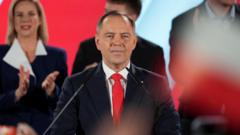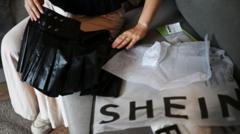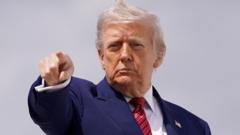Following a cancelled vote in Romania due to suspicions of foreign interference via TikTok accounts supporting a far-right candidate, the EU is examining TikTok's content recommendation policies and potential violations of the Digital Services Act.
EU Launches Investigation into TikTok for Alleged Foreign Interference in Romanian Elections

EU Launches Investigation into TikTok for Alleged Foreign Interference in Romanian Elections
The European Union's executive branch has initiated an investigation into TikTok regarding potential foreign meddling in the recent presidential elections in Romania.
The European Union's executive arm has announced a formal investigation into TikTok amid concerns of potential foreign interference in the recent Romanian presidential elections. The inquiry was prompted by "serious indications" that the popular video-sharing platform was used to manipulate the electoral process.
Recently declassified intelligence suggested that approximately 25,000 TikTok accounts had been activated just weeks prior to the first round of voting. These accounts predominantly supported a little-known far-right independent candidate, Calin Georgescu, who controversially referred to Russian President Vladimir Putin as a "patriot and a leader," despite denying any fan devotion. Following these revelations, Romanian officials canceled the second-round voting that was scheduled for earlier this month.
European Commission President Ursula von der Leyen emphasized the need to safeguard democracies against foreign interference by commenting, "Whenever we suspect such interference, especially during elections, we must act swiftly and firmly." The investigation will focus on whether TikTok's advertising practices and algorithms breach the Digital Services Act (DSA), which is designed to prevent the spread of misinformation and curb illicit online activities.
Georgescu's campaign heavily relied on TikTok for outreach. Although Moscow has denied any involvement, Romanian intelligence sources have labeled the country as a target, viewing it as a NATO adversary. Notably, TikToks promoting Georgescu's candidacy failed to adhere to legal requirements, as they were not marked as election content, leading to allegations of impropriety. Reports indicate that one account allocated around $381,000 (£300,000) for Georgescu's promotional posts, despite his denial of financial involvement.
TikTok has categorically rejected these claims, asserting that it's untrue to suggest Georgescu's account received any preferential treatment. In response to concerns raised by Romanian authorities regarding unmarked videos, the platform stated that it acted to address the issue within a 24-hour period.
As part of the ongoing investigation, the EU will evaluate the threats associated with the "automated exploitation" of TikTok's algorithm, which curates content for users based on their preferences and interactions. Additionally, the EU has directed TikTok to preserve internal documentation concerning how it recommends content and to address concerns about controlling potential "intentional manipulation" of the platform during forthcoming national elections in various EU countries, including Romania, Croatia, and Ireland, set between late 2024 and early 2025.
This inquiry complements another investigation investigating whether TikTok has violated the DSA by spreading harmful content and failing to protect minors. Following the first round of voting, reports from Romanian intelligence suggested that Georgescu's rapid surge in popularity was attributed to a "highly organized" and "guerrilla" social media campaign, which utilized a swarm of accounts sending identical messages. Leading up to the canceled run-off, Georgescu was in a close contest with reform-minded candidate Elena Lasconi, and his platform included proposals to halt political and military support to Ukraine. Additionally, Georgescu is known for espousing conspiracy theories, including skepticism about the moon landings and the COVID-19 pandemic.





















